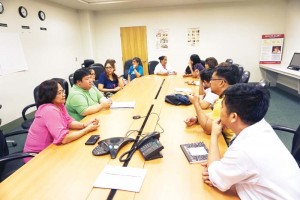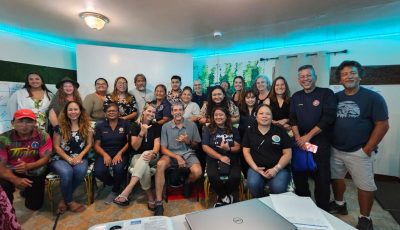CHCC nurses struggle to extend stay

Eighteen Commonwealth Health Center nurses meet to go over the options available to them in terms of their continued employment and immigration status in the CNMI. (Bea Cabrera)
The 18 nurses of the Commonwealth Healthcare Corp. whose CW-1 visas are about expire and the hospital’s management team are exhausting all efforts to renew or extend the nurses’ working visas in the CNMI.
CHCC CEO Esther Muña said the nurses need to stay so as not to disrupt operations of the Commonwealth Health Center and lose the quality of healthcare of current patients.
“It is the harm that we are trying to avoid, harm to our patients and eventually to the community. That is why we are exhausting all options to keep the nurses in the hospital.” said Muña.
“They are not just clinical nurses,” Muña added. “They are specialized nurses that took specific courses to be qualified with the work that they do now.”
The nurses face the threat of being sent home because of inaction on their employment petitions for fiscal year 2018. Also, U.S. Citizenship and Immigration Services has yet to release the receipts of these employment petitions.
CHCC did try to avail of the 240-day extension USCIS gave for CW-1 workers but was later told to show the receipts from the employment petitions, which USCIS has yet to release in the first place. The petitions were submitted on April 10, 2017.
Ray Alejandre, head nurse at the CHC intensive care unit, related that some nurses were set to leave on June 29, 30, or July 1, 2017, but were forced to reschedule their departure to July 1 “because we are having meetings and discussions to know our short- and long-term options.”
“We worry about our patients. All the 18 nurses represent critical positions in the hospital,” added Alejandre.
Five of the affected nurses are from the CHC emergency room, four are from ICU, two are from neo-natal ICU, two are from the operating room, two are from medical and surgical, one is from pediatric, one is from labor and delivery, and one is from dialysis.
Uncertainties about their immigration petitions are on top of other problems.
Bernard Gaspar, a staff nurse at the ICU, said, “If we do not get extended, we will have to go home and it is not guaranteed that there is a job open for us in October. Right now we are faced with uncertainty.”
“One, it is hard for us to plan our lives long-term on island. An example would be our apartments. Should we keep it and pay for rent and utilities even if we are away or should we give it up and face the hardship of looking for a place to stay when we come back?
“Two, our leave credits were our saving grace. If our employment petition to start in October 2017 is approved by USCIS, our absence from the island and hospital will be credited to the leaves that we rightfully gained and the pay we get from that will keep us afloat while unemployed.”
“Third, we lose our benefits. If we leave on July 1 without getting renewed, we lose employment status at CHCC and with it goes our benefits, especially our health insurance coverage,” Gaspar said
The uprooting of her family from Saipan is the hardest for Rosalie Garcia, a staff nurse at ER.
“I have worked at CHCC for almost eight years and at the Rota Health Center for more than five years and this situation we are in is a very big problem because it affects my family, especially my kids. It is very hard for me to see my son and hear him say he doesn’t want to go. He attends school here at Hopwood Middle School and have established friendship with other kids. If we go home, it is like a bad dream.”
Another problem the nurses face is the lack of coordination between USCIS and the U.S. Embassy in the Philippines.
“The U.S. Embassy in the Philippines is not aware of the 240-day extension they give to CW-1 workers. Granted that we are given the 240-day extension on Saipan, the data that the U.S. Embassy have in the Philippines would show we are overstaying.” Gaspar said.
“This is the talk that’s been going around and we don’t want to be blacklisted. The U.S. Embassy in the Philippines puts people who violate visa agreements on a blacklist,” Gaspar added
Muña said that she and her staff have been constantly following up with USCIS.
“We consider these nurses family. They belong to the community and they continue to contribute through their labor and care for patients. We want the USCIS to know that we have to put healthcare a priority and more so with the people that provide them,” said Muña.



























